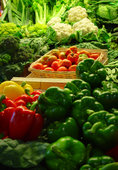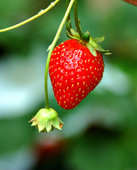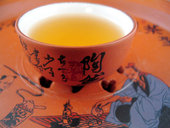 |
||
|
||||||||||
| About Us | ||||||||||
|
||||||||||
| Schedule Appointment | ||||||||||
| Help For Your Health | ||||||||||
|
||||||||||
| Testimonials/Success Stories | ||||||||||
| Our Blog | ||||||||||
 Yelp About Us Yelp About Us |
||||||||||
| Newsletter Archives | ||||||||||
| Resources and Links | ||||||||||
| FAQs | ||||||||||
| Home |
ORAC Scores: What are they and should you care?
What is ORAC | Oxidation | Antioxidants | Why ORAC? | References
What is ORAC? Before we can really discuss the benefits of antioxidants, we need to understand what oxidation is, and how it affects our bodies. According to Dr. Andrew Weil, “Oxidation is the chemist’s term for the process of removing electrons from an atom or molecule. The result of this change can be destructive – rusting iron is a familiar result of oxidation. Here, oxygen is the responsible agent, but other oxidizing agents, such as chlorine, can be as harsh. Although we need oxygen to live, high concentrations of it are actually corrosive and toxic. We obtain energy by burning fuel with oxygen – that is, by combining digested food with oxygen from the air we breathe. This is a controlled metabolic process that, unfortunately, also generates dangerous byproducts. These include free radicals – electronically unstable atoms of molecules capable of stripping electrons from any other molecules they meet in an effort to achieve stability. In their wake they create even more unstable molecules that then attack their neighbors in domino-like chain reactions. Oxidative stress is the total burden placed on organisms by the constant production of free radicals in the normal course of metabolism plus whatever other pressures the environment brings to bear (natural and artificial radiation, toxins in air, food and water; and miscellaneous sources of oxidizing activity such as tobacco smoke)." (2)
First, it assumes that anti-oxidant foods are good for us, and that the more we eat, the healthier we will be. While this may be true, it is equally possible that it is not true that more is better. And generally speaking we are healthiest when we eat a wide variety of whole, minimally processed, organic foods. We are, after all, omnivores. Second, the ORAC scale was determined by looking at chemical constituents of foods in a test tube, not in actual human beings. Just because a food is rich in antioxidants does not mean that these nutrients are readily accessible to a human who eats them. Third, when comparing ORAC data, care must be taken to be certain the units and foods being compared are similar. Some evaluations will compare ORAC units per gram of dry weight, others will evaluate ORAC units in wet weight and still others will look at ORAC units per serving. Under each evaluation, different foods can appear to have higher ORAC values. For example, although a raisin has no more antioxidant potential than the grape from which it was dried, raisins will appear to have a higher ORAC value per gram of wet weight than grapes due to their reduced water content. Likewise, the large water content in watermelon can make it appear as though this fruit is low in ORAC. Similarly, the typical quantity of food used should be considered; herbs and spices may be high in ORAC, but are applied in much smaller quantities than for other foods. (4) While some food producers are using ORAC scores as a marketing tool for their products, the United States Department of Agriculture, previously a publisher of ORAC data, withdrew its web publication of ORAC values for common American foods in 2012 due to absence of scientific evidence that ORAC has any biological significance. (5) References 2) http://www.drweil.com/drw/u/QAA400537/Stumped-by-Oxidative-Stress.html 4) Tapsell, Linda C; Ian Hemphill, Lynne Cobiac, Craig S Patch, David R Sullivan, Michael Fenech, Steven Roodenrys, Jennifer B Keogh, Peter M Clifton, Peter G Williams, Virginia A Fazio, Karen E Inge (2006-08-21). "Health benefits of herbs and spices: the past, the present, the future". The Medical Journal of Australia 185 (4 Suppl): S4–24. ISSN 0025-729X.PMID 17022438. Retrieved 2009-09-23. 5) United States Department of Agriculture, Agricultural Research Service. "Withdrawn: Oxygen Radical Absorbance Capacity (ORAC) of Selected Foods, Release 2 (2010)". 16 May 2012.
|
*DISCLAIMER: Testamonials used on this site are real comments made by people who have worked with us. As with any medical treatment, we cannot guarantee results and individual experiences may vary.
Images of people on this site are used for illustrative purposes only. The models depicted should not be construed to endorse any products or services promoted on this site, nor should they be construed to have any healthcare issues discussed on this site.Copyright © 2001-2017 Eastern Body Therapy. All Rights Reserved.


 So, oxidative stress can cause damage to cells, which in turn can lead to medical conditions such as cancer, Alzheimer’s disease, and Parkinson’s disease. But, oxidation is a normal physiological process which allows us to break down foods, mix them molecularly with oxygen, and provide the fuel our bodies need to function. According to Dr. Mercola,
So, oxidative stress can cause damage to cells, which in turn can lead to medical conditions such as cancer, Alzheimer’s disease, and Parkinson’s disease. But, oxidation is a normal physiological process which allows us to break down foods, mix them molecularly with oxygen, and provide the fuel our bodies need to function. According to Dr. Mercola, Are antioxidants good for us? It depends! Generally it is better to obtain antioxidants from a well balanced diet of mostly organic and minimally processed foods than it is to take supplements. And just because you need vitamin A today does not mean that it will be the best antioxidant for you tomorrow or next week. Your body’s need for individual nutrients will vary from day to day based on what you’ve eaten and what types of stressors you have experienced. There are numerous studies which suggest that one anti-oxidant or another is the best thing since sliced bread and will instantly solve all of your health problems. But for every study promoting the benefits of an anti-oxidant substance there is an equally compelling article suggesting that this substance is harmful to your health.
Are antioxidants good for us? It depends! Generally it is better to obtain antioxidants from a well balanced diet of mostly organic and minimally processed foods than it is to take supplements. And just because you need vitamin A today does not mean that it will be the best antioxidant for you tomorrow or next week. Your body’s need for individual nutrients will vary from day to day based on what you’ve eaten and what types of stressors you have experienced. There are numerous studies which suggest that one anti-oxidant or another is the best thing since sliced bread and will instantly solve all of your health problems. But for every study promoting the benefits of an anti-oxidant substance there is an equally compelling article suggesting that this substance is harmful to your health.